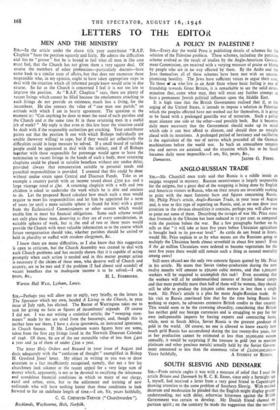ANGLO-RUSSIAN TRADE Sta,—Mr. Churchill once truly said. that Russia is
a riddle inside an enigma wrapped in mystery. Russian secretiveness is largely responsible for the enigma, but a great deal of the wrapping is being done by English and American visitor i to Russia, who on their return are invariably rushing to print with the most fantastic facts and figures concerning Russia. Mr. Philip Price's article, Anglo-Russian Trade' in your issue of August and, is true to this type of reporting on Russia, and, as no one drew your attention to the obvious absurdities it contains, perhaps you will allow me to point out some of *them. Describing the ravages of war Mr. Price states that livestock in the Ukraine has been reduced to 15 per cent, as compared with the position before the war. But a few paragraphs further on he tells us that" it will, take at least five years before Ukrainian agriculture is brought back to its pre-war level." As cattle do not breed in litters, would Mr. Price explain to us by what means are the Russians going to multiply the Ukrainian herds almost sevenfold in about five years? Even if the 40 million Ukrainians were ordered to become vegetarians for the next five years there would still remain such a thing as natural mortality among cows!
Still more absurd axe the only two concrete figures quoted by Mr. Price in his article. He states that Soviet timber-production during the next twelve months will amount to 250,000 cubic metres, and that 1,200,000 workers will be required to accomplish this task! Even assuming that the workers will all be undernourished inmates of forced labour camps and that most probably more than half of them will be women, they should still be able to produce the 250,000 cubic metres in less than a single week. Mr. Price's article is a plea for more Anglo-Russian trade. As his visit to Russia ,convinced him that for the time being Russia has nothing to export, he advocates extensive British credits to that country. This would seem to be the crowning absurdity, considering that Britain has neither gold not foreign currencies and is struggling to pay for her own indispensable imports by forcing exports and • contracting loans, while, next to South Africa, Soviet Russia is the greatest producer of gold in the world. -. Of course no one is allowed to know exactly how much go'cl Russia has accumulated during the last twenty-five years, but as her production cannot be estimated at less than 50,000,000 ounces annually, it would- be surprising if the treasure in gold (not to mention platinum and other precious metals) actually held by the Soviet Govern- ment amounted to less than the enormous value of L2,000,000,000.—


























 Previous page
Previous page